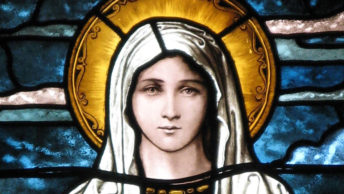You wouldn’t believe it but it is true: Martin Luther held a great devotion to Mary, the Mother of God and Our Heavenly Mother. Leaving aside all the radical distinctives of early Protestantism like the Communion of the Saints, Penance, Purgatory, Justification, the Petrine Ministry, the ordained ministry, sacramental marriage and so forth, Luther was very much in line with the Catholic Church regarding his doctrinal views concerning the Virgin Mary.
To start with, Luther gladly welcomed the traditional Catholic belief in the perpetual virginity of Mary as well as her special status as the Mother of God (Theotokos). In his Sermons on John, chapters chapters 1-4 of 1537-39, he said: Christ, ..was the only Son of Mary, and the Virgin Mary bore no children besides Him… “brothers” really means “cousins” here, for Holy Writ and the Jews always call cousins brothers. He went on explaining: He, Christ, our Savior, was the real and natural fruit of Mary’s virginal womb.. .This was without the cooperation of a man, and she remained a virgin after that… God says… “Mary’s Son is My only Son.” Thus Mary is the Mother of God.
In his treatise on ecclesiology which bears the date 1539, entitled On the Councils and the Church, this eminent Protestant reformer wrote: God did not derive his divinity from Mary; but it does not follow that it is therefore wrong to say that God was born of Mary, that God is Mary’s Son, and that Mary is God’s mother…She is the true mother of God and bearer of God…Mary suckled God, rocked God to sleep, prepared broth and soup for God, etc. For God and man are one person, one Christ, one Son, one Jesus. not two Christs. …just as your son is not two sons…even though he has two natures, body and soul, the body from you, the soul from God alone.
Another very big surprise for us Catholics is the fact that Luther accepted wholeheartedly the doctrinal belief in Mary’s Immaculate Conception. In his Sermon On the Day of the Conception of the Mother of God, of 1527, Luther said: It is a sweet and pious belief that the infusion of Mary’s soul was effected without original sin; so that in the very infusion of her soul she was also purified from original sin and adorned with God’s gifts, receiving a pure soul infused by God; thus from the first moment she began to live she was free from all sin. From his volume which deals specifically on prayer named Little Prayer Book of 1522, Luther says: She is full of grace, proclaimed to be entirely without sin—something exceedingly great. For God’s grace fills her with everything good and makes her devoid of all evil.
Luther shared his belief of the Catholic Church in the bodily Assumption of the Virgin Mary. Let us take a look at his sermon of August 15, 1522 where he preached on the Feast of the Assumption for the last time: There can be no doubt that the Virgin Mary is in heaven. How it happened we do not know. And since the Holy Spirit has told us nothing about it, we can make of it no article of faith… It is enough to know that she lives in Christ. Luther had at heart the devotional practice of the veneration of Mary. Sometimes he was bold enough to express it publicly with so much love. In his Sermon of September 1, 1522, he preached: The veneration of Mary is inscribed in the very depths of the human heart. Again, in his Sermon on Christmas 1531, Luther said: [She is the] highest woman and the noblest gem in Christianity after Christ. ..She is nobility, wisdom, and holiness personified. We can never honor her enough. Still honor and praise must be given to her in such a way as to injure neither Christ nor the Scriptures.
In another sermon, this time on the Feast of the Visitation of 1537, Luther said to Mary: No woman is like you. You are more than Eve or Sarah, blessed above all nobility, wisdom, and sanctity. Whereas in his Explanation of the Magnificat of 1521, in which one encounters Luther’s highly personal, pastoral approach and love for Mary, he said: One should honor Mary as she herself wished and as she expressed it in the Magnificat. She praised God for his deeds. How then can we praise her? The true honor of Mary is the honor of God, the praise of God’s grace.. . Mary is nothing for the sake of herself, but for the sake of Christ…Mary does not wish that we come to her, but through her to God.
Luther’s love for Mary led him to share the Biblical and Catholic doctrinal position that Mary is the Spiritual Mother of us Christians. In his Christmas sermon of 1522 he said: It is the consolation and the superabundant goodness of God, that man is able to exult in such a treasure. Mary is his true Mother, Christ is his brother. God is his father. Moreover, in another Christmas sermon of 1529, he stated: Mary is the Mother of Jesus and the Mother of all of us even though it was Christ alone who reposed on her knees…If he is ours, we ought to be in his situation; there where he is, we ought also to be and all that he has ought to be ours, and his mother is also our mother.
For Luther faith has to be present all the way in prayer. If faith is lacking then it is useless that one prays. This attitude is mainly present when he comments on the Hail Mary. Luther keeps harping on the point that prayer is the direct result of a heartfelt faith not just sheer formalism. In his Sermon of March 11, 1523, he states: Whoever possesses a good (firm) faith, says the Hail Mary without danger! Whoever is weak in faith can utter no Hail Mary without danger to his salvation. Furthermore, in his Little Prayer Book of 1522, Luther said about the Hail Mary prayer: Our prayer should include the Mother of God.. .What the Hail Mary says is that all glory should be given to God, using these words: “Hail Mary, full of grace. The Lord is with thee; blessed art thou among women and blessed is the fruit of thy womb, Jesus Christ. Amen!” You see that these words are not concerned with prayer but purely with giving praise and honor…We can use the Hail Mary as a meditation in which we recite what grace God has given her. Second, we should add a wish that everyone may know and respect her…He who has no faith is advised to refrain from saying the Hail Mary.
Luther’s caution of putting the primacy of faith when praying the Hail Mary reminded me of what Pope Benedict XVI had to say regarding the recitation of the Holy Rosary in his address at the Basilica of Saint Mary Major on Saturday 3 May 2008: Today, together we confirm that the Holy Rosary is not a pious practice banished to the past, like prayers of other times thought of with nostalgia. Instead, the Rosary is experiencing a new Springtime. Without a doubt, this is one of the most eloquent signs of love that the young generation nourish for Jesus and his Mother, Mary. In the current world, so dispersive, this prayer helps to put Christ at the centre, as the Virgin did, who meditated within all that was said about her Son, and also what he did and said. When reciting the Rosary, the important and meaningful moments of salvation history are relived. The various steps of Christ’s mission are traced. With Mary the heart is oriented toward the mystery of Jesus. Christ is put at the centre of our life, of our time, of our city, through the contemplation and meditation of his holy mysteries of joy, light, sorrow and glory. May Mary help us to welcome within ourselves the grace emanating from these mysteries, so that through us we can “water” society, beginning with our daily relationships, and purifying them from so many negative forces, thus opening them to the newness of God. The Rosary, when it is prayed in an authentic way, not mechanical and superficial but profoundly, it brings, in fact, peace and reconciliation. It contains within itself the healing power of the Most Holy Name of Jesus, invoked with faith and love at the centre of each “Hail Mary”.
To conclude, although Luther was totally against the intercession and invocation of the saints, which he publicly denied, in accord with the earliest systematic Lutheran creed, the Augsburg Confession of 1530 (Article 21), we can say that his opinions about Mary as Mother of God and as ever-Virgin coupled with his opinions on the Immaculate Conception, Mary’s “Spiritual Motherhood” were identical to those within the Catholic tradition. Perhaps Luther encourages us to pray with faith to Mary so that we can fruitfully benefit from her special maternal intercession for us before Her Son Jesus.
Let us now conclude our reflection by praying with Martin Luther this beautiful prayer to Mary which is featured in his beautiful Commentary on the Magnificat in 1521:
O blessed Virgin and Mother of God, how very little and lowly were you esteemed, and yet God looked upon you with abundant graces and riches and has done great things for you. Indeed, you were not at all worthy of this. But high and wide, above and beyond your merit, is the rich, overflowing grace of God in you. How good, how blessed are you for all eternity, from the moment you found such a God!








